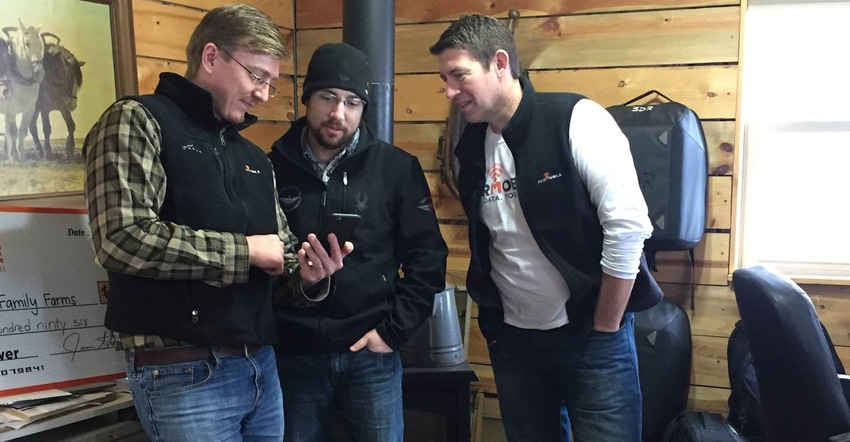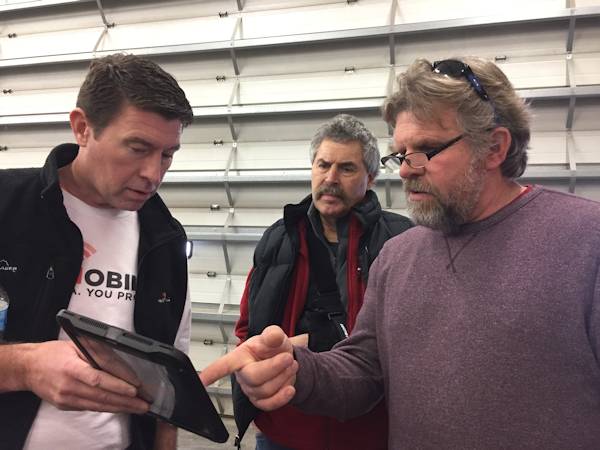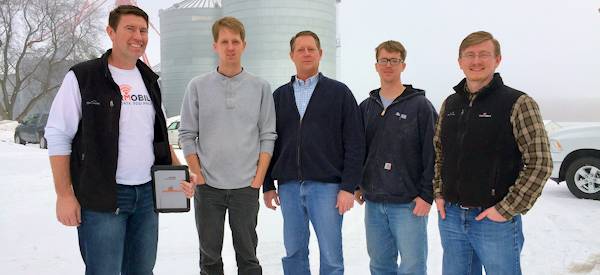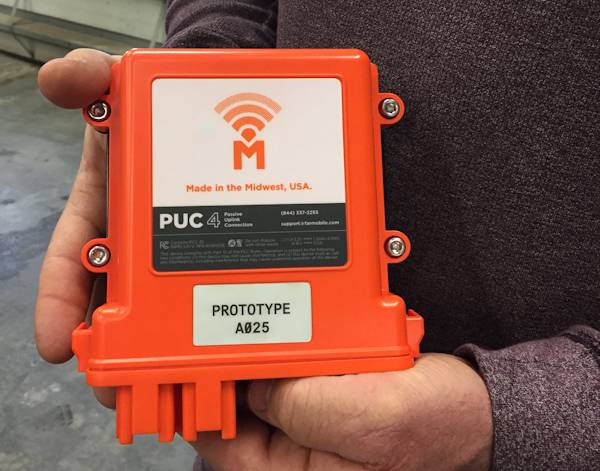
On the Owatonna, Minn., farm where his grandfather once picked corn by hand, Bob Heers just cashed in on a new crop: data.
History unfolded last week as he and several other Minnesota farmers received the first round of checks paid by Farmobile, a Kansas-based startup that’s going global. It’s believed to be the first time that farmers have been paid for data, said founder and CEO Jason Tatge.
Farmobile evenly splits revenues from vetted buyers with farmers, who are signing up from here to Hungary. With backing of Dutch venture firm Anterra Capital and a new partnership with Agco, Farmobile is poised to announce its first customers.
In a promotion to show farmers how this new revenue stream works, Farmobile is paying $2 per certified acre for completed Electronic Field Records (EFRs) across Minnesota, where the Data Store launched last April.

Farmobile CEO Jason Tatge, left, shows Owatonna, Minn., farmers John Ihlenfeld, center, and Bob Swedberg a new feature that replays field work sessions. Tatge calls his technology “the Fitbit of farm equipment.”
Farmobile CEO Jason Tatge, left, shows Owatonna, Minn., farmers John Ihlenfeld, center, and Bob Swedberg a new feature that replays field work sessions. Tatge calls his technology “the Fitbit of farm equipment.”

Farmobile CEO Jason Tatge, left, shows Owatonna, Minn., farmers John Ihlenfeld, center, and Bob Swedberg a new feature that replays field work sessions. Tatge calls his technology “the Fitbit of farm equipment.”
Heers and sons raise corn, soybeans and peas and finish 10,000 pigs a year. They’ve branched into solar farming, “and now we’re farming data,” he said.
Heers was skeptical he’d ever be paid for his data, “but here we are today,” he said moments after receiving his $4,949 check. “We’re real excited about it. It’s been a great experience. Fun guys to work with, too.”
Tatge urges farmers to protect their recipe for achieving yields by “putting a fence around their data,” rather than simply giving it away.
“I believe that monetization of data is already happening. It’s just happening without the farmer’s involvement,” he said, adding that the data’s value increases over time.
“A lot of this data’s being acquired in ways that farmers don’t completely understand, and then they get nervous and don’t know what to do. We have a very short window in history right now for farmers to be able to stand up and say, ‘This is important to me, and we want to protect this because this is our trade secret. This is our intellectual property. This is our uniqueness.’”
Farmers in control
Tatge said Farmobile facilitates getting data into one place -- with service a priority -- and then the transaction. Farmers decide whether to approve offers.
In Kasota, Minn., sixth-generation farmer Jon Guentzel was surprised his promotional check for one year’s data totaled $9,696.

Left to right, Farmobile CEO Jason Tatge, Matt Heers, Bob Heers, Nate Heers and Heath Gerlock at Heers Family Farm in Owatonna, Minn. Tatge and Gerlock are co-founders of Kansas-based Farmobile, which last week began paying farmers as they build a library of farmer-owned data. It will be sold to vetted buyers and proceeds evenly split between farmers and Farmobile.
Left to right, Farmobile CEO Jason Tatge, Matt Heers, Bob Heers, Nate Heers and Heath Gerlock at Heers Family Farm in Owatonna, Minn. Tatge and Gerlock are co-founders of Kansas-based Farmobile, which last week began paying farmers as they build a library of farmer-owned data. It will be sold to vetted buyers and proceeds evenly split between farmers and Farmobile.

Left to right, Farmobile CEO Jason Tatge, Matt Heers, Bob Heers, Nate Heers and Heath Gerlock at Heers Family Farm in Owatonna, Minn. Tatge and Gerlock are co-founders of Kansas-based Farmobile, which last week began paying farmers as they build a library of farmer-owned data. It will be sold to vetted buyers and proceeds evenly split between farmers and Farmobile.
The story of his farm’s yield achievements represents his agronomic edge. He wants control over where that story’s going.
“That’s always been a big concern of mine -- and just having final say,” Guentzel said. “I did work with some other companies initially and I eventually unplugged from the Cloud, per se, because I wasn’t comfortable with what was happening with the data.”
He’s comfortable with Farmobile’s farmer-based approach and is using its passive uplink connection – or PUC, which collects data and makes it portable.
“They came and actually helped me hook them up, and I didn’t have to touch them the rest of the year,” Guentzel said. “I had enough PUCs for each item and I was able to run it all year without even thinking about it.”
Data uploaded to the Cloud include planting date, commodity, variety, population, harvest date, total production, average yield, average moisture and more. Data is automatically generated at year’s end.
Farmobile cofounder Heath Gerlock reviewed Guentzel’s EFR on one field, noting data on planting, spraying applications, harvest. “It’s all automatically collected into this one place with the PUCs that he put on the machines, so now he’s got a complete data set for that field,” Gerlock said.
With a simple app, Guentzel uses his data for internal decision-making, telematics to monitor equipment and more. For example, Guentzel may change how operators run the tillage tractor this year, now that he has a better feel for the most efficient way to run his equipment.
“It allows you to become a better manager, which will always equate to more efficiency and a better bottom line,” he said. “I’m happy to have a company out there trying to quantify the value of the data, rather than all these growers not realizing what they’re giving up for free and uploading to the Cloud.”

A new version of the PUC (passive uplink connection) is in development by Farmobile, which gives free upgrades as part of a $1,250 annual subscription. The PUC rides in the cab to gather machine and agronomic data. It pulls data into a single field-centered view, ending the need for flash drives and notebooks. Review info in the Farmobile App or Web Dashboard, current or historical, from anywhere.
A new version of the PUC (passive uplink connection) is in development by Farmobile, which gives free upgrades as part of a $1,250 annual subscription. The PUC rides in the cab to gather machine and agronomic data. It pulls data into a single field-centered view, ending the need for flash drives and notebooks. Review info in the Farmobile App or Web Dashboard, current or historical, from anywhere.

A new version of the PUC (passive uplink connection) is in development by Farmobile, which gives free upgrades as part of a $1,250 annual subscription. The PUC rides in the cab to gather machine and agronomic data. It pulls data into a single field-centered view, ending the need for flash drives and notebooks. Review info in the Farmobile App or Web Dashboard, current or historical, from anywhere.
In Owatonna, Bob Swedberg, John Ihlenfeld and Greg Wobschall farm about 3,500 acres of corn and soybeans. They first worked with Tatge after he started a software grain trading firm. Then, in 2014, Farmobile plugged in its very first PUC on their farm.
Swedberg said he’s worked with different services that take data and pay nothing for it. So he was gratified to get a Farmobile check for $5,786.
“You look at where companies are making money -- Facebook, Google, all these things are grabbing your data and reselling it,” Swedberg said. “In the ag market, they came up with a great idea in building this company, and I think there’s a real future in it.”
About the Author(s)
You May Also Like






